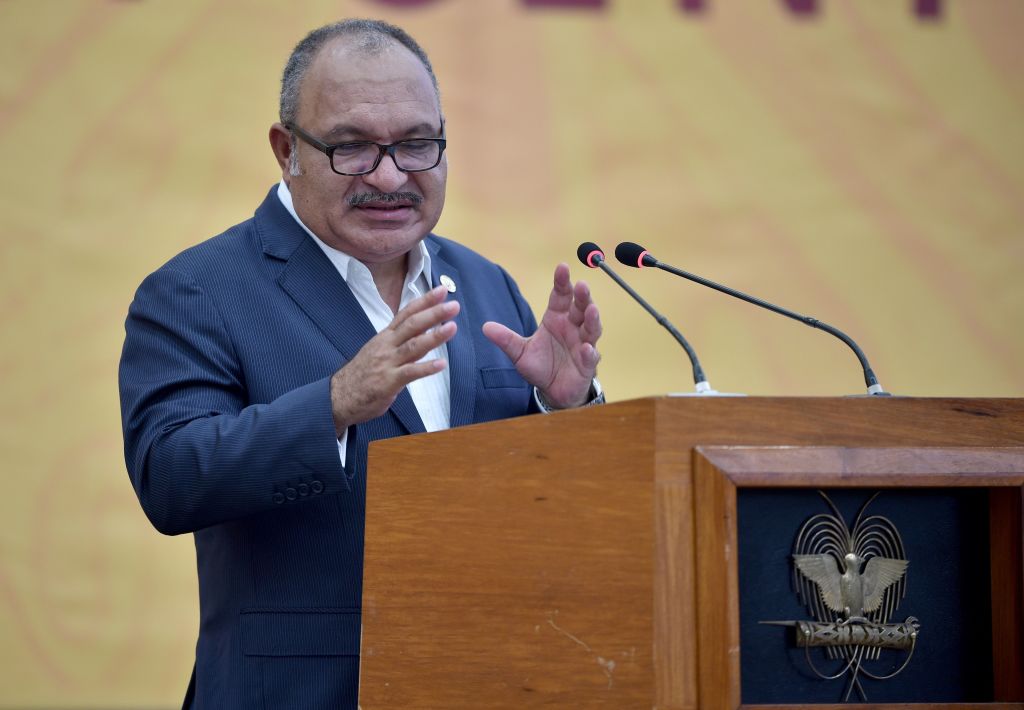In almost exactly one year, Australia’s closest neighbour, Papua New Guinea, will be celebrating 50 years of independence. However, since well before then, since at least the earliest days of European settlement, Australians have been among our best friends and staunchest allies, as attested to, and often remembered, during our crucial partnership in the Second World War.
And, as good friends, we need to be honest with each other. As such, it is time to admit that we need to recalibrate our relationship.
The last decade in the region has seen enormous changes and an increase in tensions. Superpowers China and the United States are crunching together like tectonic plates, and PNG, the Pacific’s largest economy, has become, quite suddenly, the focus of (sometimes unwanted) attention.
Unfortunately, this dynamic is proving to have a negative impact on my country and its people. It is impacting our sovereignty and our stability, and it is likely to be a security issue if it is not addressed.
To find the reasons for this, the old adage applies: follow the money.
As large sums are being handed over to the country’s elites, often with little or no accountability or transparency, the mainstream economy is faltering.
In connection to this, endemic corruption is deepening. PNG now ranks as the 133rd most corrupt out of 180 countries, according to the Transparency International Index, and this rating has been falling for years, and will keep falling if circumstances do not change.
PNG does not need more money from Australia. We are asking for that money to be better targeted, more transparent and better aligned to outcomes that are needed by everyday Papua New Guineans.
Only about 60 per cent of Papua New Guineans are functionally literate, and 85 per cent of Papua New Guineans have no access to electricity.
Even those in employment are seriously struggling, with a minimum wage set at just 3.5 Kina ($AU1) per hour. It takes a minimum wage earner around two-and-a-half days of work to earn enough for a family sized 10-kilogram bag of rice.
Such factors – and these are not isolated statistics – are fostering widespread feelings of frustration and anxiety which, in turn, are driving more and more people to violence and other sorts of crime, as we have seen with riots and outbreaks of violence in recent months across the country.
How can a society and an economy function like this?

Given all this, Papua New Guineans are grateful for the assistance provided by Australia in terms of police training and for increased law enforcement funding, such as the $AU400 million regional policing program announced at the Pacific Islands Forum in August.
But not enough is being done to address the conditions that are behind those rising crime figures and the intermittent riots that PNG has seen in recent times.
For instance, Australia has delivered more than AU$2.5 billion, on top of the estimated $AU2 billion in aid, directly into PNG’s perpetually ailing budget over the last four years alone. These funds come with minimum or no standards of transparency or accountability, apparently to ensure the government of the day doesn’t stray towards Beijing.
This gets to the nub of where Australia’s relationship with PNG has to shift.
The gaps that are being created by the current international funding approaches to PNG, with Australia at the forefront as the country’s major funder, seriously undermine PNG’s basic stability as a nation.
In short, PNG does not need more money from Australia. We are asking for that money to be better targeted, more transparent and better aligned to outcomes that are needed by everyday Papua New Guineans.
For instance, it makes more sense to fund provinces and districts in Papua New Guinea, rather than the central government. This goes a long way to ensuring the money gets to where the people live.
Australia might also upscale student places and provide support for PNG and Pacific students. My estimates suggest some 16,000 places could be readily made available on an annual basis, within existing funding models.
This would aid Canberra’s political standing with education institutions as well, given recent student number cuts.
Further, encouraging closer ties between small and medium businesses in Australia and PNG would generate economic activity at the ground level where it’s most needed. Australia’s regional business sector in particular has a lot to offer in terms of the similarity of the challenges faced also by PNG businesses, such as geographical remoteness, niche or small market reach and adaptability mechanisms.
Such programs would help stave off threats to our governance and sovereign independence, not bolster them as many current measures do.
As it stands, the gaps that are being created by the current international funding approaches to PNG, with Australia at the forefront as the country’s major funder, seriously undermine PNG’s basic stability as a nation. The security risks of that should be clear to all.
If Australia is to continue to be Papua New Guinea’s friend, as Canberra is often quick to say, then it needs to redesign its current assistance approach so that the people of Papua New Guinea, not just a grabbing elite and its international fair-weather friends, get the maximum benefit.
Peter O’Neill is the former Prime Minister of PNG from 2011 to 2019 and has had continuous service as an MP since 2002.

